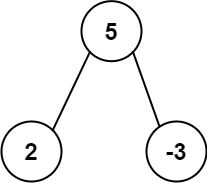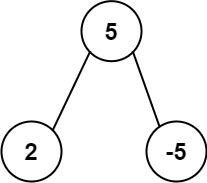二叉树
哈希表
树
深度优先搜索
题目描述
给你一个二叉树的根结点 root ,请返回出现次数最多的子树元素和。如果有多个元素出现的次数相同,返回所有出现次数最多的子树元素和(不限顺序)。
一个结点的 「子树元素和」 定义为以该结点为根的二叉树上所有结点的元素之和(包括结点本身)。
示例 1:
输入: root = [5,2,-3]
输出: [2,-3,4]
示例 2:
输入: root = [5,2,-5]
输出: [2]
提示:
节点数在 [1, 104 ] 范围内
-105 <= Node.val <= 105
解法
方法一:哈希表 + DFS
我们可以使用一个哈希表 \(\textit{cnt}\) 记录每个子树元素和出现的次数,然后使用深度优先搜索遍历整棵树,统计每个子树的元素和,并更新 \(\textit{cnt}\) 。
最后,我们遍历 \(\textit{cnt}\) ,找到所有出现次数最多的子树元素和。
时间复杂度 \(O(n)\) ,空间复杂度 \(O(n)\) 。其中 \(n\) 为二叉树的节点个数。
Python3 Java C++ Go TypeScript Rust
1
2
3
4
5
6
7
8
9
10
11
12
13
14
15
16
17
18
19
20 # Definition for a binary tree node.
# class TreeNode:
# def __init__(self, val=0, left=None, right=None):
# self.val = val
# self.left = left
# self.right = right
class Solution :
def findFrequentTreeSum ( self , root : Optional [ TreeNode ]) -> List [ int ]:
def dfs ( root : Optional [ TreeNode ]) -> int :
if root is None :
return 0
l , r = dfs ( root . left ), dfs ( root . right )
s = l + r + root . val
cnt [ s ] += 1
return s
cnt = Counter ()
dfs ( root )
mx = max ( cnt . values ())
return [ k for k , v in cnt . items () if v == mx ]
1
2
3
4
5
6
7
8
9
10
11
12
13
14
15
16
17
18
19
20
21
22
23
24
25
26
27
28
29
30
31
32
33
34
35
36
37
38
39 /**
* Definition for a binary tree node.
* public class TreeNode {
* int val;
* TreeNode left;
* TreeNode right;
* TreeNode() {}
* TreeNode(int val) { this.val = val; }
* TreeNode(int val, TreeNode left, TreeNode right) {
* this.val = val;
* this.left = left;
* this.right = right;
* }
* }
*/
class Solution {
private Map < Integer , Integer > cnt = new HashMap <> ();
private int mx ;
public int [] findFrequentTreeSum ( TreeNode root ) {
dfs ( root );
List < Integer > ans = new ArrayList <> ();
for ( var e : cnt . entrySet ()) {
if ( e . getValue () == mx ) {
ans . add ( e . getKey ());
}
}
return ans . stream (). mapToInt ( i -> i ). toArray ();
}
private int dfs ( TreeNode root ) {
if ( root == null ) {
return 0 ;
}
int s = root . val + dfs ( root . left ) + dfs ( root . right );
mx = Math . max ( mx , cnt . merge ( s , 1 , Integer :: sum ));
return s ;
}
}
1
2
3
4
5
6
7
8
9
10
11
12
13
14
15
16
17
18
19
20
21
22
23
24
25
26
27
28
29
30
31
32
33
34 /**
* Definition for a binary tree node.
* struct TreeNode {
* int val;
* TreeNode *left;
* TreeNode *right;
* TreeNode() : val(0), left(nullptr), right(nullptr) {}
* TreeNode(int x) : val(x), left(nullptr), right(nullptr) {}
* TreeNode(int x, TreeNode *left, TreeNode *right) : val(x), left(left), right(right) {}
* };
*/
class Solution {
public :
vector < int > findFrequentTreeSum ( TreeNode * root ) {
unordered_map < int , int > cnt ;
int mx = 0 ;
function < int ( TreeNode * ) > dfs = [ & ]( TreeNode * root ) -> int {
if ( ! root ) {
return 0 ;
}
int s = root -> val + dfs ( root -> left ) + dfs ( root -> right );
mx = max ( mx , ++ cnt [ s ]);
return s ;
};
dfs ( root );
vector < int > ans ;
for ( const auto & [ k , v ] : cnt ) {
if ( v == mx ) {
ans . push_back ( k );
}
}
return ans ;
}
};
1
2
3
4
5
6
7
8
9
10
11
12
13
14
15
16
17
18
19
20
21
22
23
24
25
26
27
28
29 /**
* Definition for a binary tree node.
* type TreeNode struct {
* Val int
* Left *TreeNode
* Right *TreeNode
* }
*/
func findFrequentTreeSum ( root * TreeNode ) ( ans [] int ) {
cnt := map [ int ] int {}
var mx int
var dfs func ( * TreeNode ) int
dfs = func ( root * TreeNode ) int {
if root == nil {
return 0
}
s := root . Val + dfs ( root . Left ) + dfs ( root . Right )
cnt [ s ] ++
mx = max ( mx , cnt [ s ])
return s
}
dfs ( root )
for k , v := range cnt {
if v == mx {
ans = append ( ans , k )
}
}
return
}
1
2
3
4
5
6
7
8
9
10
11
12
13
14
15
16
17
18
19
20
21
22
23
24
25
26
27
28
29
30
31
32 /**
* Definition for a binary tree node.
* class TreeNode {
* val: number
* left: TreeNode | null
* right: TreeNode | null
* constructor(val?: number, left?: TreeNode | null, right?: TreeNode | null) {
* this.val = (val===undefined ? 0 : val)
* this.left = (left===undefined ? null : left)
* this.right = (right===undefined ? null : right)
* }
* }
*/
function findFrequentTreeSum ( root : TreeNode | null ) : number [] {
const cnt = new Map < number , number > ();
let mx = 0 ;
const dfs = ( root : TreeNode | null ) : number => {
if ( ! root ) {
return 0 ;
}
const { val , left , right } = root ;
const s = val + dfs ( left ) + dfs ( right );
cnt . set ( s , ( cnt . get ( s ) ?? 0 ) + 1 );
mx = Math . max ( mx , cnt . get ( s ) ! );
return s ;
};
dfs ( root );
return Array . from ( cnt . entries ())
. filter (([ _ , c ]) => c === mx )
. map (([ s , _ ]) => s );
}
1
2
3
4
5
6
7
8
9
10
11
12
13
14
15
16
17
18
19
20
21
22
23
24
25
26
27
28
29
30
31
32
33
34
35
36
37
38
39
40
41
42
43
44
45
46 // Definition for a binary tree node.
// #[derive(Debug, PartialEq, Eq)]
// pub struct TreeNode {
// pub val: i32,
// pub left: Option<Rc<RefCell<TreeNode>>>,
// pub right: Option<Rc<RefCell<TreeNode>>>,
// }
//
// impl TreeNode {
// #[inline]
// pub fn new(val: i32) -> Self {
// TreeNode {
// val,
// left: None,
// right: None
// }
// }
// }
use std :: cell :: RefCell ;
use std :: collections :: HashMap ;
use std :: rc :: Rc ;
impl Solution {
pub fn find_frequent_tree_sum ( root : Option < Rc < RefCell < TreeNode >>> ) -> Vec < i32 > {
fn dfs ( root : Option < Rc < RefCell < TreeNode >>> , cnt : & mut HashMap < i32 , i32 > ) -> i32 {
if let Some ( node ) = root {
let l = dfs ( node . borrow (). left . clone (), cnt );
let r = dfs ( node . borrow (). right . clone (), cnt );
let s = l + r + node . borrow (). val ;
* cnt . entry ( s ). or_insert ( 0 ) += 1 ;
s
} else {
0
}
}
let mut cnt = HashMap :: new ();
dfs ( root , & mut cnt );
let mx = cnt . values (). cloned (). max (). unwrap_or ( 0 );
cnt . into_iter ()
. filter ( |& ( _ , v ) | v == mx )
. map ( | ( k , _ ) | k )
. collect ()
}
}
GitHub


